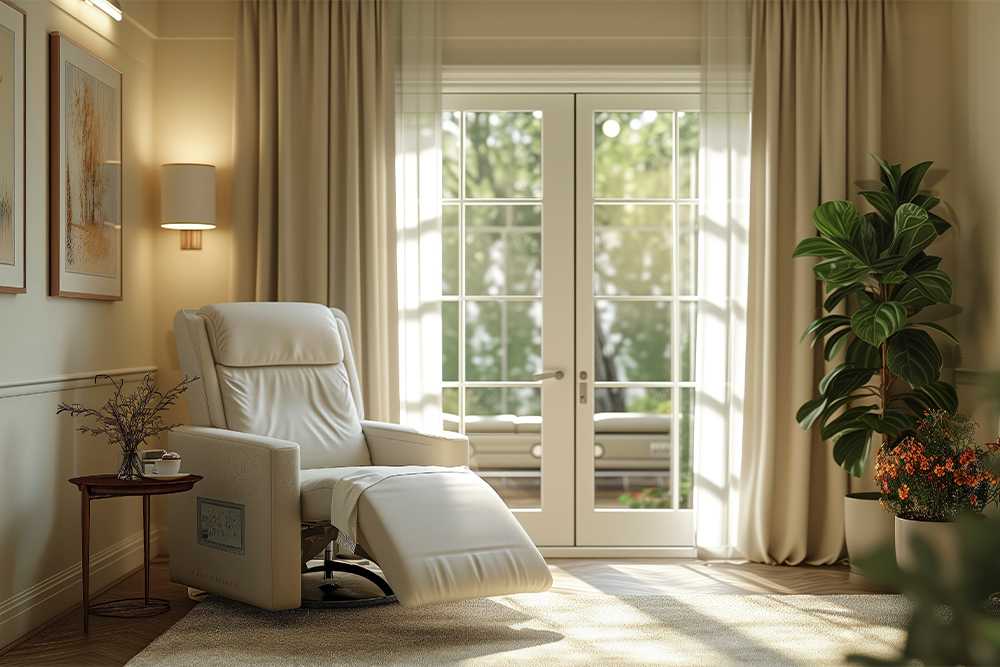Posted by Janine Griffiths
How to choose the right assisted living care facility for your loved one

Assisted living is ideal for those who don’t need full-time medical care but could benefit from a secure, friendly environment that supports their unique needs and desires. These communities focus on bringing people together, with inviting spaces, shared meals, and activities that encourage connection and joy. From group exercise to game nights, there are countless ways for residents to stay active, social, and engaged.
Unlike nursing homes, which provide more intensive medical support, assisted living centres have a much higher focus on helping elderly people to retain independence.
It’s a choice that many families find comforting, knowing their loved one is in a place where their independence is encouraged and their wellbeing is a priority.
In this blog, we’ll discuss how to choose the right assisted living facility for yourself or a loved one, and the considerations you need to keep in mind when choosing an assisted living facility.
What is an assisted living care facility?
An assisted living care facility is a residential option designed to support older adults who may need help with daily tasks but still wish to maintain a degree of independence. These facilities provide a middle ground between living completely independently and receiving full-time care, such as what’s offered in nursing or care homes.
In these types of facilities, residents live in self-contained flats, bungalows or houses, which offer a warm and caring environment for older adults who desire a balance of independence and support. It's a place where residents can enjoy the comforts of home while receiving help with daily tasks, such as bathing, dressing, and medication management.
With a focus on respect and dignity, these facilities encourage residents to maintain control over their routines and interests, all while knowing caring staff are close by to provide a helping hand whenever needed.
Types of assisted living care facilities
Choosing the right assisted living care facility is a deeply personal decision that often involves finding a place where someone feels safe, valued, and at home.
Each type of facility offers unique services and care levels, making it possible to find the best fit for individual needs, health considerations, and lifestyle preferences.
Below, we’ll explore a few types of assisted living care facilities, each designed to support a wide range of needs with compassion and understanding.
Standard assisted living
Standard assisted living facilities provide a comfortable environment where residents can receive support with daily tasks like meal preparation, dressing, and medication reminders. Here, the emphasis is on preserving each person’s independence while offering caring assistance whenever needed. These facilities often offer inviting communal spaces and a variety of social activities, ensuring that residents feel part of a warm, welcoming community. Staff are attentive and responsive, focusing on individual needs with a gentle, personal approach.
Memory care assisted living
Memory care facilities are specially designed to support individuals with Alzheimer’s, dementia, or other cognitive conditions. These centres offer a secure, structured setting where residents can engage in familiar routines and therapeutic activities tailored to their unique abilities. Staff members in memory care facilities are trained in dementia care and work patiently with residents to create a nurturing, safe environment that minimises confusion and promotes calm. By maintaining a gentle pace and encouraging daily successes, memory care helps residents retain a sense of identity and dignity.
Enhanced assisted living
Enhanced assisted living offers additional support for those who may need more hands-on care than standard facilities can provide. With licensed medical staff on hand, these facilities can accommodate residents with complex health needs or mobility challenges.
However, they still place a strong emphasis on helping each person stay active and engaged at their own level. Enhanced assisted living facilities aim to provide residents with the extra care they need while respecting their independence and ensuring they feel involved in daily life and activities.
Financial considerations when searching for an assisted living facility
The cost of assisted living varies widely and can feel overwhelming, especially when trying to find the best care without financial strain. In this section, we will cover the factors that impact the cost of assisted living care facilities and options you have when paying for care provision either for yourself or a loved one.
What influences the cost of assisted living care facilities?
There are many factors that influence the cost of assisted living care facilities. This includes things such as:
- Location
- Meals
- What facilities are available
- Level of care needed
- Whether you are renting or buying
Payment options and financial assistance
For those seeking financial assistance, there are several options to explore. For example you may qualify for financial aid through local councils or other government programmes. Additionally, private funding options, such as long-term care insurance or personal savings, can often help with the costs.
Some facilities may also offer flexible payment plans or tiered care packages, allowing families to adjust services as needs change. With thoughtful planning, it’s possible to find an option that aligns with both care needs and financial comfort, providing loved ones with the support they deserve without added stress. Autumna’s directory makes it easy to search for retirement communities offering rental, part-buy/part-rent, and other flexible options.
Important factors when choosing assisted living
Deciding to move into an assisted living facility is a significant step, and choosing the right place requires careful thought. Taking time to consider personal needs, preferences, and future care can help ensure the decision feels right for everyone involved. Below we have listed some key factors to keep in mind to help make the transition as smooth and positive as possible.
Level of independence
Reflect on the degree of independence that is important for you or your loved one. Assisted living facilities vary in the level of support they provide, so it’s essential to find a place that aligns with personal needs. Consider how much assistance is necessary with daily activities and whether the facility encourages an environment where residents can maintain as much autonomy as possible.
Location and proximity to family
The location of the assisted living facility can significantly impact the quality of life. Being close to family and friends can provide comfort and support during the transition. Additionally, consider the surrounding community—access to parks, shops, and other amenities can enhance daily life and provide opportunities for social engagement.
Quality of life and social opportunities
Look for facilities that prioritise resident wellbeing and offer a range of social activities that keep you stimulated. Opportunities for interaction, hobbies, and exercise are vital for mental and emotional health. Understanding the community’s culture and available activities programmes can help ensure that residents feel engaged and connected.
Healthcare services available
Evaluate the healthcare services offered by the facility. Understanding what medical support is available can ease concerns about future health needs. Depending on what your needs are, look for facilities that provide access to on-site or nearby medical professionals or partnerships with local healthcare providers, to ensure that you can access healthcare should you ever need it.
Long-term viability
Consider the potential for future needs and whether the facility can accommodate changing care requirements over time. If your care needs ever change, it is worth enquiring whether the facility offers a continuum of care and allows residents to remain in the same community as needs change. This can provide peace of mind, knowing that additional support will be readily available without needing to move to a different location.
Staff and caregiver interactions
The quality of staff interactions is crucial in creating a supportive environment. During visits, observe how caregivers interact with residents—kindness, patience, and attentiveness are key indicators of a compassionate care team. Speaking with current residents and their families can also provide insight into the level of care and the overall atmosphere of the facility.
By thoughtfully considering these factors, families can make a decision that not only meets immediate needs but also creates a sense of belonging, comfort, and dignity for the future.
Questions to ask before moving into an assisted living care facility
Choosing an assisted living facility is a significant decision, and asking the right questions can help ensure that you find a place that meets your needs and provides a supportive, nurturing environment. Here are some important questions to consider when evaluating potential facilities:
- What types of care and services are available?
- How are staff members trained and qualified?
- What is the staff-to-resident ratio?
- How are health emergencies handled?
- What are the costs and what do they include?
- What activities and social programmes are offered?
- How does the facility handle transitions in care?
- Can they provide references or testimonials from current residents and families?
By asking these questions, you can gain a deeper understanding of the facility and make an informed decision that prioritises the quality of life and happiness of yourself or your loved ones. A thorough assessment of potential options will help ensure that the chosen assisted living facility is the right fit for a fulfilling and supportive living experience.
Looking for an assisted living provider?
If you’re searching for the right care provider for yourself or a loved one, Autumna is here to assist. Our comprehensive directory allows you to quickly find care options tailored to your needs and location. Just choose the type of care required, enter your preferred area, and browse local providers in moments.
For a more personalised experience, you can also answer a few simple questions, and we’ll match you with a list of care providers suited to your specific requirements.
Receive a Free Retirement Property Shortlist!
Let our expert team of advisers get your search off to a great start.
Tell us a little about your needs and we'll send you a bespoke shortlist of retirement homes! Click the button below to begin, it takes just a few minutes.
Other articles to read
From the blog

Older Persons Care Advice
How to shortlist care homes in Exeter
April 17th, 2025
Looking for an adult day care centre near you? Discover how to find safe, joyful care for your loved one—and support for yourself—on Autumna.

Older Persons Care Advice
What is Discharge to Assess?
April 16th, 2025
Discover how Discharge to Assess (D2A) supports faster recovery, reduces hospital stays, and how Autumna helps simplify finding the right care.

Older Persons Care Advice
What are the benefits of person-centred care?
April 9th, 2025
Discover the benefits of person-centred care—from improved wellbeing to better outcomes—for individuals, families, and care providers alike.
Frequently Asked Questions
Most seniors move into assisted living between the ages of 75 and 85, although the decision is based more on an individual's health and personal needs rather than age alone. Assisted living can provide valuable support for those who may need help with daily tasks while still wanting to maintain a degree of independence.
Assisted living is best suited for individuals who need help with activities such as dressing, bathing, medication management, and meal preparation but do not require full-time medical supervision. It’s ideal for those who value independence but could benefit from having supportive care in a safe and social environment.
An assisted living facility typically provides personal care assistance, housekeeping, meals, medication reminders, and social activities. Many facilities also offer wellness programmes, 24/7 staff availability, and transportation services to meet the needs of residents.






